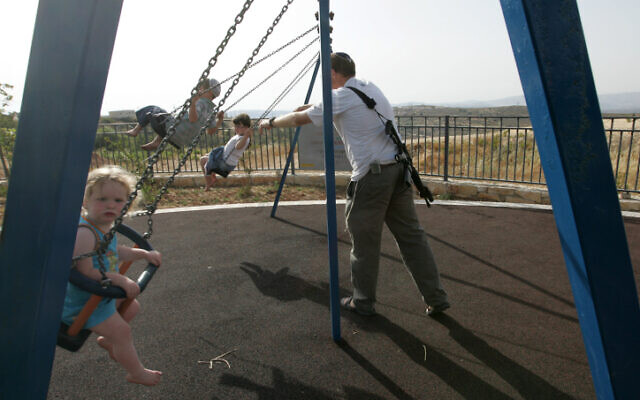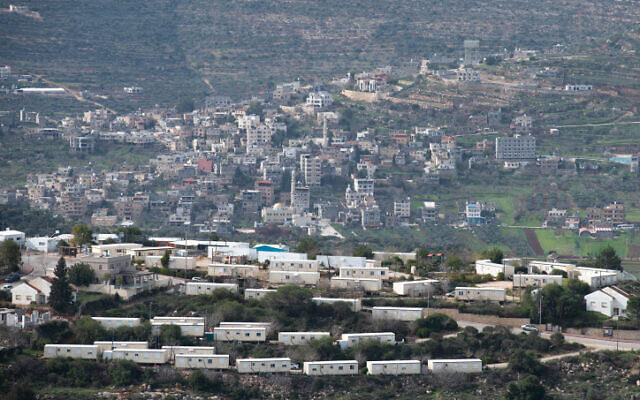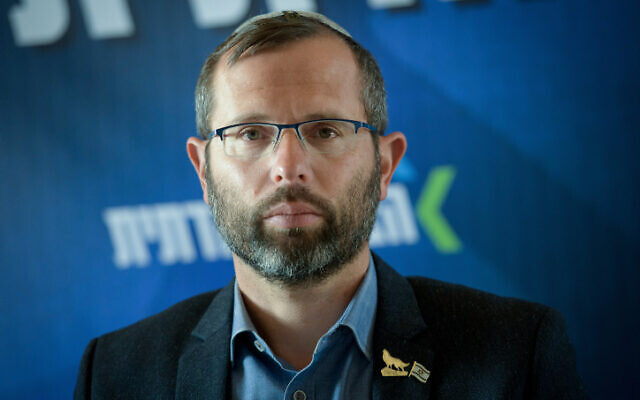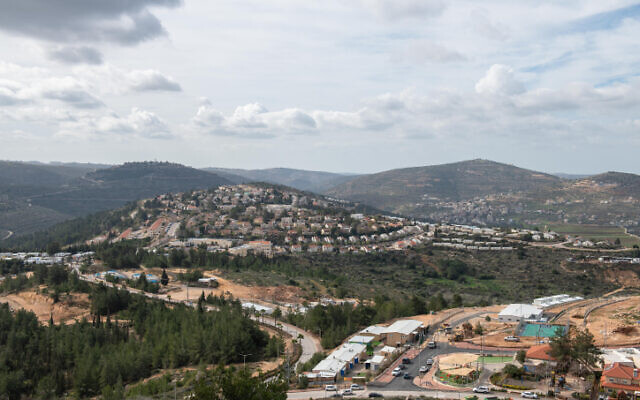Legalization of 3 West Bank outposts among plans slated for approval next week
Netanyahu, Smotrich, Gallant clear plans for advancement after deadly terror attack on Tuesday near Eli; illegal communities lie adjacent to settlement
Jeremy Sharon is The Times of Israel’s legal affairs and settlements reporter
Settlement development projects set to be given preliminary approval next week would retroactively legalize three illegal outposts close to the settlement of Eli in the northern West Bank, if they ultimately receive final authorization.
Of those outposts, the plan to legalize two of them was approved directly by Prime Minister Benjamin Netanyahu, Defense Minister Yoav Gallant, and Finance Minister Bezalel Smotrich on Wednesday for passage to the Civil Administration to begin the planning authorization process.
That decision was made following Tuesday’s terror attack in which four Israelis were killed in a terror attack at a petrol station just outside Eli.
This coming Monday, the Higher Planning Council of the Civil Administration is set to discuss, and likely advance, plans for the development of some 5,800 housing units in settlements across the West Bank.
Among those are two sets of plans to build 407 housing units in the illegal outposts of Nof Harim and Hayovel, and a further 347 units in the nearby Palgei Mayim outpost — all of which are adjacent to the main settlement of Eli.
Other plans set for approval next week would advance the approval process for more housing units in Eli itself.
Nof Harim, Hayovel and Palgei Mayim are illegally built outposts established in 1998 and 1999 without government authorization and in contravention of the designated land use for the land on which they were built.

They are nevertheless considered by the Eli settlement to be extended neighborhoods of the original settlement, even though they are all located several kilometers away from Eli itself.
The plans that the Higher Planning Council will discuss on Monday will change the designated land use for those plots of land from agricultural land to land for residential purposes, in effect retroactively legalizing the outposts.
All the plans are at the initial stages of the bureaucratic review process, however, and would likely take a significant period of time to advance to final approval.
“Prime Minister Netanyahu, Defense Minister Gallant, and Finance Minister Smotrich agreed to immediately advance planning for some 1,000 new housing units in the Eli settlement close to the site of the terror attack yesterday,” read Wednesday’s joint statement.
“Our response to terror is to hit it hard and build in our land,” the statement added.

Speaking to The Times of Israel, Israel Gantz, head of the Mateh Binyamin Regional Council in the West Bank, welcomed the announcement of the construction plans for Eli, which is in Mateh Binyamin’s jurisdiction, noting that he and the regional council had been involved in efforts to persuade Netanyahu, Gallant and Smotrich to advance the plans.
“If every time a Palestinian murdered Israelis we built 100 housing units, then the terror would quickly stop,” Gantz asserted, arguing that since the “purpose of terror is to chase us away” from the land, the fitting answer was to deepen Israel’s presence in the territory.
Gantz also called for a strong military response to the recent terror attacks, saying that the IDF needed to enter Palestinian cities and “eradicate the terror nests” by engaging armed gunmen to either kill or capture them in order to reduce the terrorist threat against Israeli civilians in the West Bank and beyond.
Asked about the riots and arson attacks carried out by settler youths in the village of Turmus Ayya on Wednesday, Gantz was critical of their actions but declined to explicitly denounce them.
“No one should take the law into their own hands, only the IDF and the security services are responsible for enforcing the law,” said Gantz. “I for sure do not agree with such actions but I don’t deal with denunciations, I don’t denounce rapes in Tel Aviv either.”
Gantz also assiduously avoided questions as to whether or not the culprits, if caught, should be prosecuted.

“What is infuriating about the question is that you don’t ask for Benny Gantz or other public figures like him to denounce shooting and rock throwing and firebomb attacks by Arabs in Judea and Samaria, which happen every day,” he said, using the biblical term for the West Bank.
The rioting settlers “are youths who see their friends murdered before their eyes and this causes them incredible pain and anger, and they don’t know how to deal with these emotions.
“We need to deal with helping these youths through social frameworks and other more serious frameworks in order to teach them how to properly deal with these feelings,” said Gantz.










